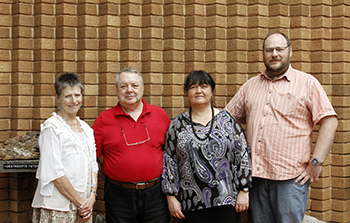Latest News Archive
Please select Category, Year, and then Month to display items
![]()
The composition of the Council of the University of the Free State is stipulated in the UFS Statute, as promulgated in the Government Gazette of 26 January 2018. The terms of office of the President of Convocation, Prof Johan Grobbelaar, Christo Dippenaar, Henry Madlala (Qwaqwa Campus) expire on 31 October 2018. Convocation has to appoint three representatives in their place, one of which has to be the President of Convocation and another should be from the Qwaqwa Campus. In terms of the Statute, both Dippenaar and Madlala are eligible for re-election.
Written nominations for the election of three representatives of the Convocation for a period of four years, are hereby requested.
The Convocation comprises of all permanent academic staff from lecturer to professor, all permanent staff other than academic staff from Deputy Director to Rector and Vice-Chancellor by virtue of their respective offices and all students (current and former) who obtained a qualification at the university.
Each nomination shall be signed by five members of Convocation and shall contain the written acceptance of the nomination by the nominee under his or her signature, as well as an abridged CV (±2pages). These must reach Dawid Kriel by 12:00 on Monday 12 November 2018. If more than one person per each of the three categories is nominated, elections will be held on or before Friday 16 November 2018. You will be notified of the final date for elections in due course. Please submit your nomination via:
• E-mail: dawid@ufs.ac.za
• Fax: 086 643 1665
• Post: Dawid Kriel University of the Free State: Institutional Advancement PO Box 339 Bloemfontein 9300
• Hand delivered at: Dawid Kriel, Room 26, 1st Floor, Wekkie Saayman Building, Bloemfontein Campus
For enquiries, please contact Claudine Taylor at TaylorCL@ufs.ac.za or +27 51 401 2097.
Click here for the nominations form.
Famous mineralogists visit UFS Geology
2017-04-25

From the left: Prof Marian Tredoux, Associate
Professor at the UFS Department of Geology;
Prof Giorgio Garuti; from the University of Leoben,
Dr Federica Zaccarini, also from the
University of Leoben and Dr Freddie Roelofse,
Head of the Department of Geology at the UFS.
Photo: Rulanzen Martin
Years of academic friendship and collaboration is what makes Prof Giorgio Garuti and Dr Federica Zaccarini return to the University of the Free State (UFS) every so often.
The world-renowned academic duo from the University of Leoben in Austria were guest lecturers at the UFS Department of Geology. “We are here because we have known Professor Marian Tredoux and the Geology Department, for a long time. We are really happy to be here, and to be given the opportunity to present talks,” said Dr Zaccarini. The two are experts in platinum-group element mineralogy and each has given their surname to minerals namely, the Garutiite and Zaccariniite minerals.
Visit great advantage for research
They are acclaimed experts on very small minerals (smaller than a hundredth of a millimetre) with emphasis on platinum group elements in chrome-rich rocks. “Their visit is a great advantage for us. We also conduct research on these minerals and can learn from them,” said Prof Marian Tredoux, affiliated researcher at the Department of Geology.
Dr Zaccarini gave a lecture on Chromitites, and associated platinum-group elements, in ophiolites on Wednesday 5 April 2017 and Dr Garuti presented a lecture on Uralian-Alaskan complexes: a puzzling source of platinum, on Thursday 6 April 2017. During the talks they examined the association of the platinum-group minerals with chromite, rather than sulphide, and how this association can lead to the formation of unusual platinum-group element ores.
Collaboration on various academic papers
They and Prof Tredoux have collaborated on various research articles over the past four years, which have been published in various important international scientific journals. “These journals play an important role in calculating the H-scale which measures how important a researcher’s work is on an international scale,” said Prof Tredoux.